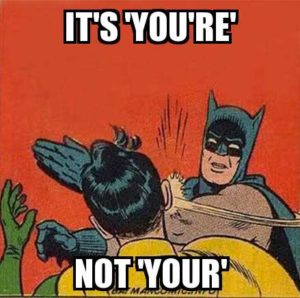Is grammar obsolete in the age of social media? Definitely not. While some rules change and words join the dictionary’s ranks, some things stay the same. Blogging and social media require good grammar in order for your business to be taken seriously.
Here are a few fails to avoid. Polish up your grammar skills for a squeaky clean brand reputation.
Your and You’re
Thought you conquered this piece of grammar in middle school? Double-think. Use “your” when discussing possession. A correct use of “your” looks like this sentence: “Your grammar skills are essential for copywriting success.”
“You’re,” in contrast, is a contraction of “you” and “are.” An appropriate use of “you’re” would look like this: “You’re likelier to excel in blogging if you invest time in proofreading content.”
Apostrophes Do Not Pluralize Words
Adding an apostrophe to a word does not pluralize it — it merely indicates a contraction or a possessive word. For instance, it would be incorrect to say “Free Hot Dog’s.”
Pluralization varies depending on the word. If you’re not sure, check in the dictionary to avoid losing credibility with your audience.
Their, There, They’re
“Their” is possessive. “They’re” is a contraction of “they” and “are.” “There” is a pronoun. A correct usage of the terms would look like this sentence: “They’re at their house over there.”
Take care not to mix up these three words for improved grammar.
Split Infinitives
Split infinitives aren’t technically incorrect grammar. However, some view them as incorrect and they make it harder to read a piece of content. A split infinitive occurs when you insert an adverb in between “to” and a verb. A split infinitive would look like this: “He decided to assiduously persevere.” Split infinitives obscure sentences. Avoid split infinitives to improve clarity.
Tense Situations
Ensure that your verb tenses match up. If you decide to write a history of content marketing, choose a tense — past or present — and stick with it. Switching tenses unnecessarily or by accident can confuse the reader and skew the text’s meaning.
Watch out for tense errors especially in white papers or any lengthy piece of content. Long-form pieces offer more opportunities for proofreading and more opportunities for grammatical errors.
Avoiding these grammar errors will increase brand credibility and reputation. Stay on top of your prose for the best results from your creative efforts!
By Esther Grace Ehrenman





